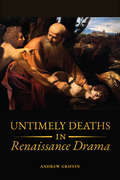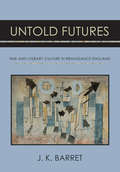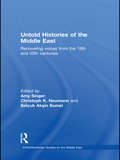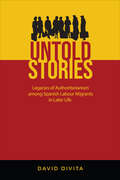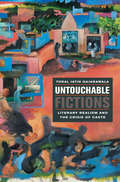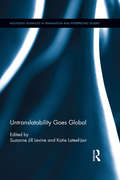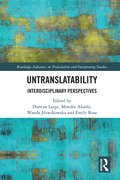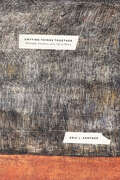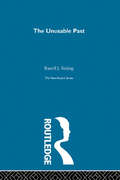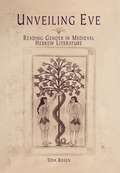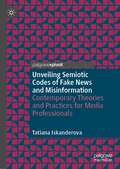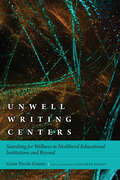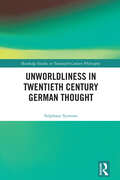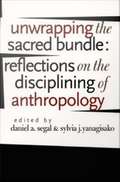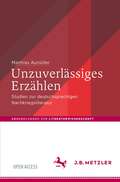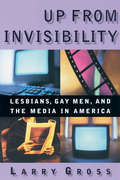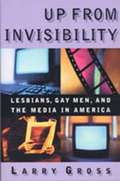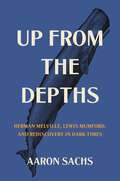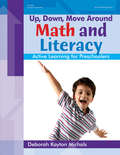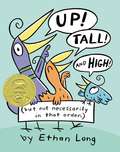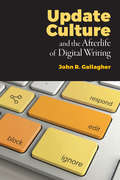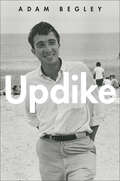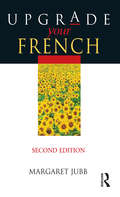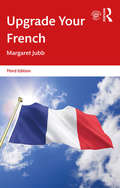- Table View
- List View
Untimely Deaths in Renaissance Drama
by Andrew GriffinIn the decades before history was institutionalized as a scholarly discipline, historical writing was practiced variously by poets, record keepers, lawyers, sermonizers, mythologizers, and philosophers. In this welter of competing forms of historical thought, early modern drama often operated as a site in which claims about the nature of historical change could be treated in a frequently conflicting manner. To explore this arena of competing forms of historical explanation, Untimely Deaths in Renaissance Drama focuses on the problem of narrative abruption in a selection of historically minded early modern plays as they rely on various strategies to make sense of biography and fatality. Arguing that narrative forms fail in the face of untimely death, Andrew Griffin shows that the disruption appears as a matter of trauma, making the untimely death both a point of narrative conflict and a social problem. Exploring the formula that early modern dramatists used to make sense of life and death, this book draws on the wider context of this period’s culture of historical writing.
Untold Futures: Time and Literary Culture in Renaissance England
by J. K. BarretIn Untold Futures, J. K. Barret locates models for recovering the variety of futures imagined within some of our most foundational literature. These poems, plays, and prose fictions reveal how Renaissance writers embraced uncertain potential to think about their own present moment and their own place in time. The history of the future that Barret reconstructs looks beyond futures implicitly dismissed as impossible or aftertimes defined by inevitability and fixed perspective. Chapters on Philip Sidney's Old Arcadia, Edmund Spenser’s The Faerie Queene, William Shakespeare’s Titus Andronicus, Antony and Cleopatra, and Cymbeline, and John Milton’s Paradise Lost trace instead a persistent interest in an indeterminate, earthly future evident in literary constructions that foreground anticipation and expectation.Barret argues that the temporal perspectives embedded in these literary texts unsettle some of our most familiar points of reference for the period by highlighting an emerging cultural self-consciousness capable of registering earthly futures predicated on the continued sameness of time rather than radical ruptures in it. Rather than mapping a particular future, these writers generate imaginative access to a range of futures. Barret makes a strong case for the role of language itself in emerging conceptualizations of temporality.
Untold Histories of the Middle East: Recovering Voices from the 19th and 20th Centuries (SOAS/Routledge Studies on the Middle East)
by Amy SingerMuch traditional historiography consciously and unconsciously glosses over certain discourses, narratives, and practices. This book examines silences or omissions in Middle Eastern history at the turn of the twenty-first century, to give a fuller account of the society, culture and politics. With a particular focus on the Ottoman Empire, Turkey, Egypt, Iran and Palestine, the contributors consider how and why such silences occur, as well as the timing and motivation for breaking them. Introducing unexpected, sometimes counter-intuitive, issues in history, chapters examine: women and children survivors of the Armenian massacres in 1915 Greek-Orthodox subjects who supported the Ottoman empire and the formation of the Turkish republic the conflicts among Palestinians during the revolt of 1936-39 pre-marital sex in modern Egypt Arab authors writing about the Balkans the economic, not national or racial, origins of anti-Armenian violence the European women who married Muslim Egyptians Drawing on a wide range of sources and methodologies, such as interviews; newly-discovered archives; fictional accounts; and memoirs, each chapter analyses a story and its suppression, considering how their absences have affected our previous understandings of the history of the Middle East.
Untold Stories: Legacies of Authoritarianism among Spanish Labour Migrants in Later Life (Anthropological Horizons)
by David DivitaForgetting about Spain’s civil war (1936–9) and subsequent dictatorship was long seen as a necessary safeguard for the democracy that emerged after General Francisco Franco’s death in 1975. Since the early 2000s, however, public discussion of historical memory has awakened efforts to remember this past through the personal testimonies of Spaniards who experienced it firsthand. Untold Stories expands accounts of twentieth-century Spain by presenting an ethnography of an ignored population: the impoverished men and women who fled Franco’s dictatorship in the 1960s, participating in a wave of labour migration to northern Europe. Now in their eighties, they were born around the time of the civil war and came of age during its repressive aftermath before leaving Spain as young adults. The book features a community of such Spaniards, who gather regularly at a senior centre on the outskirts of Paris. Drawing on concepts from linguistic anthropology, David Divita analyses conversational encounters recorded among the seniors to demonstrate how a turbulent past shapes mundane moments of social interaction in the present. Documenting what is said as well as what is not, Divita reveals through detailed textual analysis how silence can pervade the creation of social meanings – such as belonging, authority, and legitimacy. Untold Stories illuminates the impact of a harrowing historical period on some of Spain’s most marginal citizens in the early years of the dictatorship.
Untouchable Fictions: Literary Realism and the Crisis of Caste
by Toral Jatin GajarawalaUntouchable Fictions considers the crisis of literary realism- progressive, rural, regionalist, experimental- in order to derive a literary genealogy for the recent explosion of Dalit (“untouchable” caste) fiction. Drawing on a wide array of fiction from Premchand and Renu in Hindi to Mulk Raj Anand and V.S. Naipaul in English, Gajarawala illuminates the dark side of realist complicity: a hidden aesthetics and politics of caste. How does caste color the novel? What are its formal tendencies? What generic constraints does it produce? Untouchable Fictions juxtaposes the Dalit text, and its radical critique, with a history of progressive literary movements in South Asia. Gajarawala reads Dalit writing dialectically, doing justice to its unique and groundbreaking literary interventions while also demanding that it be read as an integral moment in the literary genealogy of the 20th and 21st century. How might we trace the origins of the rise of Dalit fiction in the critical “realism” of the Progressive Writers Association of the 1930s, or in the gaps laid bare by the peasant novel of the 1950s? And what kind of dialogue does “untouchable caste” writing with its more famous counterpart: the Anglophone fiction of the last few decades? Under Gajarawala’s lens the aesthetic languages of Hindi and English are intertwined and caste becomes a central category of literary analysis. This book, grounded in the fields of postcolonial theory, South Asian literatures, and cultural studies will be important for all readers interested in the problematic relations between aesthetics and politics, between social movements and cultural production. Engaged as it is with contemporary theories of realism and the problem of aesthetics, it would also be of interest to students of English, comparative literature, contemporary Third World literature, and historians of literary movements. More specifically, as a text that considers recent developments in genre theory and South Asian fiction, it would interest scholars of the Indian and Indian Anglophone novel. Finally, this project, as an interrogation of caste politics in the cultural sphere, is an important contribution to the burgeoning field of Dalit studies.
Untranslatability Goes Global (Routledge Advances in Translation and Interpreting Studies)
by Suzanne Jill Levine Katie Lateef-JanThis collection brings together contributions from translation theorists, linguists, and literary scholars to promote interdisciplinary dialogue about untranslatability and its implications within the context of globalization. The chapters depart from the pragmatics of translation practice and move on to consider the role of the translator’s voice and the translator as author in specific literary works. The volume as a whole seeks to study and at times dramatize the interplay between translation as a creative practice and its place within the dynamic between local and global examining case studies across a wide variety of literary genres and traditions across regions. By highlighting the complex interface between translation practice and theory, translator and author, and local and global, this book will be of particular interest to graduate students and scholars in translation studies and literary studies.
Untranslatability: Interdisciplinary Perspectives (Routledge Advances in Translation and Interpreting Studies)
by Emily Rose Duncan Large Motoko Akashi Wanda JózwikowskaThis volume is the first of its kind to explore the notion of untranslatability from a wide variety of interdisciplinary perspectives and its implications within the broader context of translation studies. Featuring contributions from both leading authorities and emerging scholars in the field, the book looks to go beyond traditional comparisons of target texts and their sources to more rigorously investigate the myriad ways in which the term untranslatability is both conceptualized and applied. The first half of the volume focuses on untranslatability as a theoretical or philosophical construct, both to ground and extend the term’s conceptual remit, while the second half is composed of case studies in which the term is applied and contextualized in a diverse set of literary text types and genres, including poetry, philosophical works, song lyrics, memoir, and scripture. A final chapter examines untranslatability in the real world and the challenges it brings in practical contexts. Extending the conversation in this burgeoning contemporary debate, this volume is key reading for graduate students and researchers in translation studies, comparative literature, gender studies, and philosophy of language. The editors are grateful to the University of East Anglia Faculty of Arts and Humanities, who supported the book with a publication grant.
Untying Things Together: Philosophy, Literature, and a Life in Theory
by Eric L. SantnerUntying Things Together helps to clarify the stakes of the last fifty years of literary and cultural theory by proposing the idea of a sexuality of theory. In 1905, Freud published his Three Essays on the Theory of Sexuality, the book that established the core psychoanalytic thesis that sexuality is central to formations of the unconscious. With this book, Eric L. Santner inverts Freud’s title to take up the sexuality of theory—or, more exactly, the modes of enjoyment to be found in the kinds of critical thinking that, since the 1960s, have laid claim to that ancient word, “theory.” Santner unfolds his argument by tracking his own relationship with this tradition and the ways his intellectual and spiritual development has been informed by it.Untying Things Together is both an intellectual history of major theoretical paradigms and a call for their reexamination and renewal. Revisiting many of the topics he has addressed in previous work, Santner proposes a new way of conceptualizing the eros of thinking, attuned to how our minds and bodies individually and collectively incorporate or “encyst” on a void at the heart of things. Rather than proposing a “return to theory,” Santner’s book simply employs theory as a way of further “(un)tying together” the resources of philosophy, art and literature, theology, psychoanalysis, political thought, and more.
Unusable Past
by Russell J. ReisingFirst Published in 2002. Routledge is an imprint of Taylor & Francis, an informa company.
Unveiling Eve
by Tova RosenSelected by Choice magazine as an Outstanding Academic TitleUnveiling Eve is the first feminist inquiry into the Hebrew poetry and prose forms cultivated in Muslim and Christian Spain, Italy, and Provence in the eleventh through fourteenth centuries. In the Jewish Middle Ages, writing was an exclusively male competence, and textual institutions such as the study of scripture, mysticism, philosophy, and liturgy were men's sanctuaries from which women were banished. These domains of male expertise--alongside belles lettres, on which Rosen's book focuses--served as virtual laboratories for experimenting with concepts of femininity and masculinity, hetero- and homosexuality, feminization and virilization, transvestism and transsexuality. Reviewing texts as varied as love lyric, love stories, marriage debates, rhetorical contests, and liturgical and moralistic pieces, Tova Rosen considers the positions and positioning of female figures and female voices within Jewish male discourse.The idolization and demonization of women present in these texts is read here against the background of scripture and rabbinic literature as well as the traditions of chivalry and misogyny in the hosting Islamic and Christian cultures. Unveiling Eve unravels the literary evidence of a patriarchal tradition in which women are routinely rendered nonentities, often positioned as abstractions without bodies or reified as bodies without subjectivities. Without rigidly following any one school of feminist thinking, Rosen creatively employs a variety of methodologies to describe and assess the texts' presentation of male sexual politics and delineate how women and concepts of gender were manipulated, fictionalized, fantasized, and poeticized. Inaugurating a new era of critical thinking in Hebrew literature, Unveiling Eve penetrates a field of medieval literary scholarship that has, until now, proven impervious to feminist criticism.
Unveiling Semiotic Codes of Fake News and Misinformation: Contemporary Theories and Practices for Media Professionals
by Tatiana IskanderovaThis book offers a comprehensive exploration of the widespread issue of fake news and misinformation. Using real-life examples and semiotic theory, the author demonstrates how language, images, and symbols are being utilized in media production and distribution with the intention of altering the perception of individuals and shaping their beliefs. The book also addresses how social and cultural factors influence the spread of information and emphasizes the importance of understanding the context in which information is being received and shared. This book is a must-read for anyone seeking to understand the impact of fake news and misinformation on society, especially academics, researchers, journalists, policymakers, and media professionals at all levels. The author provides contemporary theories and practical strategies to navigate the complex and ever-changing media landscape.
Unwell Writing Centers: Searching for Wellness in Neoliberal Educational Institutions and Beyond
by Genie Nicole GiaimoUnwell Writing Centers focuses on the inroads the wellness industry has made into higher education. Following graduate and undergraduate writing tutors during a particularly stressful period (2016–2019), Genie Nicole Giaimo examines how top-down and bottom-up wellness interventions are received and taken up by workers. Engaging sociocultural research on how workers react to and experience workplace conflict, Giaimo demonstrates the kinds of interventions welcomed by workers as well as those that fall flat, including the “easy” fixes to workplace issues that institutions provide in lieu of meaningful and community-based support. The book is broken into sections based on journeying: searching for wellness, finding wellness, and imagining a “well” future that includes a sustainable model of writing center work. Each chapter begins with a personal narrative about wellness issues in writing centers, including the author’s experiences in and responses to local emergencies. She shares findings from a longitudinal assessment study on non-institutional interventions in writing centers and provides resources for administrators to create more ethical "well" writing centers. The book also includes an appendix of training documents, emergency planning documents, and several wellness-specific interventions developed from anti-racist, anti-neoliberal, and organizational theories. Establishing the need for a field-specific response to the austerity-minded eruption of wellness-focused interventions in higher education, Unwell Writing Centers is a critical text for graduate students and new directors that can easily be applied in workplaces in and outside of higher education.
Unworldliness in Twentieth Century German Thought (Routledge Studies in Twentieth-Century Philosophy)
by Stéphane SymonsWhat happens when the world around us feels fragmented? How can a person continue to respond positively to their environment when it seems to have lost its internal coherence? These questions lie at the heart of this innovative interpretation of some of the most influential German philosophers of the twentieth century. The key figures in this study are the young Georg Lukács (1885–1971), Ernst Jünger (1895–1998), Ernst Bloch (1885–1977), Theodor Adorno (1903–1969), Max Kommerell (1902–1944), and Siegfried Kracauer (1889–1966).By establishing an intellectual dialogue among these otherwise diverse thinkers, this study identifies a common interest: the question whether an unworldly, fragmented universe can nonetheless elicit a creative response from individuals. Together, these authors offer an alternative to what is considered the dominant trend in twentieth-century German philosophy: the phenomenological emphasis on humans' lived interactions with a shared and unified lifeworld. Special attention is given to six distinct interpretations of Miguel de Cervantes's novel Don Quixote and the unworldly actions of its main character.Unworldliness in Twentieth Century German Thought will appeal to researchers and advanced students interested in twentieth-century continental philosophy, German intellectual history, critical theory, and literature and philosophy.
Unwrapping the Sacred Bundle: Reflections On the Disciplining of Anthropology
by Daniel A. Segal Sylvia J. YanagisakoLively, forceful, and impassioned, Unwrapping the Sacred Bundle is a major intervention in debates about the configuration of the discipline of anthropology. In the essays brought together in this provocative collection, prominent anthropologists consider the effects of and alternatives to the standard definition of the discipline as a "holistic" study of humanity based on the integration of the four fields of archaeology, biological anthropology, sociocultural anthropology, and linguistic anthropology. Editors Daniel A. Segal and Sylvia J. Yanagisako provide a powerful introduction to the volume. Unabashed in their criticism of the four-field structure, they argue that North American anthropology is tainted by its roots in nineteenth-century social evolutionary thought. The essayists consider the complex state of anthropology, its relation to other disciplines and the public sphere beyond academia, the significance of the convergence of linguistic and cultural anthropology, and whether or not anthropology is the best home for archaeology. While the contributors are not in full agreement with one another, they all critique "official" definitions of anthropology as having a fixed, four-field core. The editors are keenly aware that anthropology is too protean to be remade along the lines of any master plan, and this volume does not offer one. It does open discussions of anthropology's institutional structure to all possible outcomes, including the refashioning of the discipline as it now exists. Contributors. James Clifford, Ian Hodder, Rena Lederman, Daniel A. Segal, Michael Silverstein, Sylvia J. Yanagisako
Unzuverlässiges Erzählen: Studien zur deutschsprachigen Nachkriegsliteratur (Abhandlungen zur Literaturwissenschaft)
by Matthias AumüllerDie einzelnen Studien dieser Open Access-Monographie (zu Werken u.a. von A. Andersch, Th. Bernhard, H. Böll, M. Frisch, G. Grass, H. Risse, A. Schmidt, O.F. Walter und G. Wohmann) geben in der Summe einen Überblick über die Variabilität, mit der das Verfahren narrativer Unzuverlässigkeit in der deutschsprachigen Literatur der Nachkriegszeit von 1945 bis 1969 realisiert wurde. Auf diese Weise werden nicht nur die verfahrenstechnischen Möglichkeiten in systematischer Hinsicht ausgeleuchtet, sondern auch die narrativen Abdrücke vermessen, mit denen das Verfahren diese literaturgeschichtliche Phase geprägt hat. Zur Verdeutlichung des literaturhistorischen Zusammenhangs schließt die Untersuchung einzelne Werke von Autoren der älteren Generation (Th. Mann, H. Broch, R. Neumann und A. Seghers) ein und endet mit einem Ausblick auf das unzuverlässige Erzählen in der DDR-Literatur.
Up from Invisibility: Lesbians, Gay Men, and the Media in America (Between Men-Between Women: Lesbian and Gay Studies)
by Larry GrossA half century ago gay men and lesbians were all but invisible in the media and, in turn, popular culture. With the lesbian and gay liberation movement came a profoundly new sense of homosexual community and empowerment and the emergence of gay people onto the media's stage. And yet even as the mass media have been shifting the terms of our public conversation toward a greater acknowledgment of diversity, does the emerging "visibility" of gay men and women do justice to the complexity and variety of their experience? Or is gay identity manipulated and contrived by media that are unwilling—and perhaps unable—to fully comprehend and honor it? While positive representations of gays and lesbians are a cautious step in the right direction, media expert Larry Gross argues that the entertainment and news media betray a lingering inability to break free from proscribed limitations in order to embrace the complex reality of gay identity. While noting major advances, like the opening of the Oscar Wilde Memorial Bookstore—the first gay bookstore in the country—or the rise of The Advocate from small newsletter to influential national paper, Gross takes the measure of somewhat more ambiguous milestones, like the first lesbian kiss on television or the first gay character in a newspaper comic strip.
Up from Invisibility: Lesbians, Gay Men, and the Media in America (Between Men-Between Women: Lesbian and Gay Studies)
by Larry GrossA half century ago gay men and lesbians were all but invisible in the media and, in turn, popular culture. With the lesbian and gay liberation movement came a profoundly new sense of homosexual community and empowerment and the emergence of gay people onto the media's stage. And yet even as the mass media have been shifting the terms of our public conversation toward a greater acknowledgment of diversity, does the emerging "visibility" of gay men and women do justice to the complexity and variety of their experience? Or is gay identity manipulated and contrived by media that are unwilling—and perhaps unable—to fully comprehend and honor it? While positive representations of gays and lesbians are a cautious step in the right direction, media expert Larry Gross argues that the entertainment and news media betray a lingering inability to break free from proscribed limitations in order to embrace the complex reality of gay identity. While noting major advances, like the opening of the Oscar Wilde Memorial Bookstore—the first gay bookstore in the country—or the rise of The Advocate from small newsletter to influential national paper, Gross takes the measure of somewhat more ambiguous milestones, like the first lesbian kiss on television or the first gay character in a newspaper comic strip.
Up from the Depths: Herman Melville, Lewis Mumford, and Rediscovery in Dark Times
by Professor Aaron SachsA double portrait of two of America’s most influential writers that reveals the surprising connections between them—and their uncanny relevance to our age of crisisUp from the Depths tells the interconnected stories of two of the most important writers in American history—the novelist and poet Herman Melville (1819–1891) and one of his earliest biographers, the literary critic and historian Lewis Mumford (1895–1990). Deftly cutting back and forth between the writers, Aaron Sachs reveals the surprising resonances between their lives, work, and troubled times—and their uncanny relevance in our own age of crisis.The author of Moby-Dick was largely forgotten for several decades after his death, but Mumford helped spearhead Melville’s revival in the aftermath of World War I and the 1918–1919 flu pandemic, when American culture needed a forebear with a suitably dark vision. As Mumford’s career took off and he wrote books responding to the machine age, urban decay, world war, and environmental degradation, it was looking back to Melville’s confrontation with crises such as industrialization, slavery, and the Civil War that helped Mumford to see his own era clearly. Mumford remained obsessed with Melville, ultimately helping to canonize him as America’s greatest tragedian. But largely forgotten today is one of Mumford’s key insights—that Melville’s darkness was balanced by an inspiring determination to endure.Amid today’s foreboding over global warming, racism, technology, pandemics, and other crises, Melville and Mumford remind us that we’ve been in this struggle for a long time. To rediscover these writers today is to rediscover how history can offer hope in dark times.
Up, Down, Move Around -- Math and Literacy: Active Learning for Preschoolers
by Deborah Kayton MichalsMovement-inspiring activities reinforce key literacy and math concepts!Young children learn best when they connect physical activity with learning! Up, Down, Move Around is packed with fun, simple math and literacy activities that will have your children jumping, shaking, rolling, dancing, and clapping as they learn!From the Syllable Freeze Dance to a Math Orchestra, children ages 3 to 6 will actively explore letters and numbers as they develop number sense, practice counting and rhyming, and learn about letter shapes and story structure.
Up, Simba!
by David Foster WallaceIn February 2000, "Rolling Stone" magazine sent David Foster Wallace, "NOT A POLITICAL JOURNALIST, " on the road for a week with Senator John McCain's campaign to win the Republican nomination for the Presidency. They wanted to know why McCain appealed so much to so many Americans, and particularly why he appealed to the "Young Voters" of America who generally show nothing but apathy.<P>Here, "iPublish" brings out the "Director's Cut" (three times longer than the RS article) of this incisive, funny, thoughtful piece about life on "Bullshit One" -- the nickname for the press bus that followed McCain's Straight Talk Express.<P>This piece becomes ever more relevant, as we discuss what we know, don't know, and don't want to know about the way our political campaigns work.
Up, Tall And High!
by Ethan LongThree side-splitting stories in one great picture book! In three laugh-out-loud situations, an irresistible cast of colorful birds illustrate the concepts of "up," "tall" and "high. " First, a short peacock proves that he may not be tall, but he definitely isn't small. Then, a resourceful bird helps his penguin friend find a way to fly. Finally, two birds want to live in the same tree, but what goes up must come down! Each short story features a flap that reveals a surprise twist. With fun fold-outs, easy-to-read text, and a hilarious cast of characters, these stories beg preschoolers and emerging readers to act them out again and again.<P><P> Winner of the Theodore Seuss Geisel Medal
Update Culture and the Afterlife of Digital Writing
by John R GallagherUpdate Culture and the Afterlife of Digital Writing explores “neglected circulatory writing processes” to better understand why and how digital writers compose, revise, and deliver arguments that undergo sometimes constant revision. John R. Gallagher also looks at how digital writers respond to comments, develop a brand, and evolve their arguments—all post-publication. With the advent of easy-to-use websites, ordinary people have become internet writers, disseminating their texts to large audiences. Social media sites enable writers’ audiences to communicate back to the them, instantly and often. Even professional writers work within interfaces that place comments adjacent to their text, privileging the audience’s voice. Thus, writers face the prospect of attending to their writing after they deliver their initial arguments. Update Culture and the Afterlife of Digital Writing describes the conditions that encourage “published” texts to be revisited. It demonstrates—through forty case studies of Amazon reviewers, redditors, and established journalists—how writers consider the timing, attention, and management of their writing under these ever-evolving conditions. Online culture, from social media to blog posts, requires a responsiveness to readers that is rarely duplicated in print and requires writers to consistently reread, edit, and update texts, a process often invisible to readers. This book takes questions of circulation online and shows, via interviews with both writers and participatory audience members, that writing studies must contend with writing’s afterlife. It will be of interest to researchers, scholars, and students of writing studies and the fields of rhetoric, communication, education, technical communication, digital writing, and social media, as well as all content creators interested in learning how to create more effective posts, comments, replies, and reviews.
Updike
by Adam Begley“A brilliant biography. . . . The joys are . . . discovering the autobiographical content of the . . . details that populate Updike’s vast fictional universe.” —Orhan Pamuk, The New York Times Book ReviewAdam Begley offers an illuminating portrait of John Updike, Pulitzer prize–winning novelist, poet, short-story writer, and critic who saw himself as a literary spy in small-town and suburban America, who dedicated himself to the task of transcribing “middleness with all its grits, bumps and anonymities.”Updike explores the writer’s beloved home turf of Berks County, Pennsylvania; his escape to Harvard; his working life as the golden boy at The New Yorker; his family years in suburban Ipswich, Massachusetts; his extensive travel abroad; and his retreat to Beverly Farms, Massachusetts, where he remained until his death in 2009. Drawing from in-depth research as well as interviews with the writer’s colleagues, friends, and family, Begley explores how Updike’s fiction was shaped by his tumultuous personal life—including his enduring religious faith, his two marriages, and his first-hand experience of the “adulterous society” he was credited with exposing in the bestselling Couples.With a sharp critical sensibility, Begley probes Updike’s best-loved works—from Pigeon Feathers to The Witches of Eastwick to the Rabbit tetralogy—and reveals a surprising and deeply complex character fraught with contradictions. Updike offers an admiring yet balanced look at one of American literature’s most treasured authors.“A superb achievement. . . . as rewarding as Updike’s best fiction.” —Scott Stossel, The Boston Globe“A monumental treatment of a towering American writer.” —The New York Observer“A highly literate illumination of a supremely literate human being.” —Louis Menand, The New Yorker
Upgrade Your French
by Margaret JubbUpgrade your French is the ideal guide for students wanting to rapidly improve their written French. It offers a stimulating thirty day revision programme that is guaranteed to improve your skills. In the countdown to exams, students should simply spend between 30 minutes to an hour a day with this book, and see their mark go up a grade! This short revision guide focuses on three key strategies for improving your written French: - Eliminating common errors and slips of the pen - Increasing and consolidating vocabulary - Encouraging more varied language use The new edition is fully revised and includes a new introduction discussing the essential differences between written and spoken French and a new chapter on comparatives and superlatives. This is the ideal book for all intermediate students looking for a simple way to improve their French fast.
Upgrade Your French
by Margaret JubbUpgrade Your French is the ideal guide for students looking to improve their written French rapidly. It offers a complete revision programme to improve your skills, focusing on three key strategies for improving your written French: Eliminating common errors Increasing and consolidating vocabulary Using a wider range of expression and sentence structure This third edition includes enhanced coverage of the subjunctive and a new section on prepositions, new revision exercises at the end of each chapter (including translation sentences), and a companion website with further practice exercises. This is the ideal book for all intermediate students looking for a simple way to improve their French fast.
